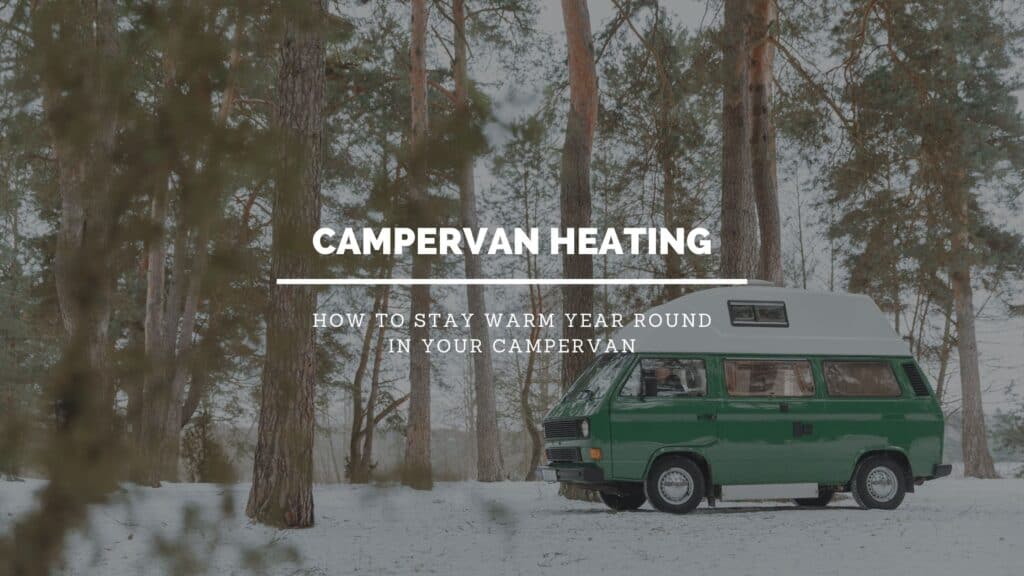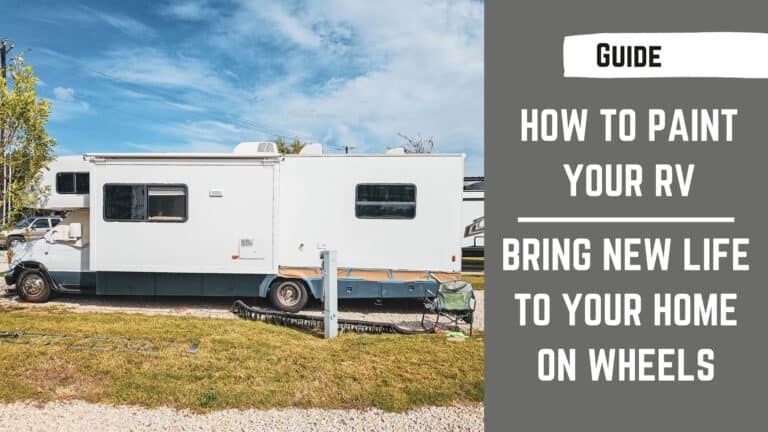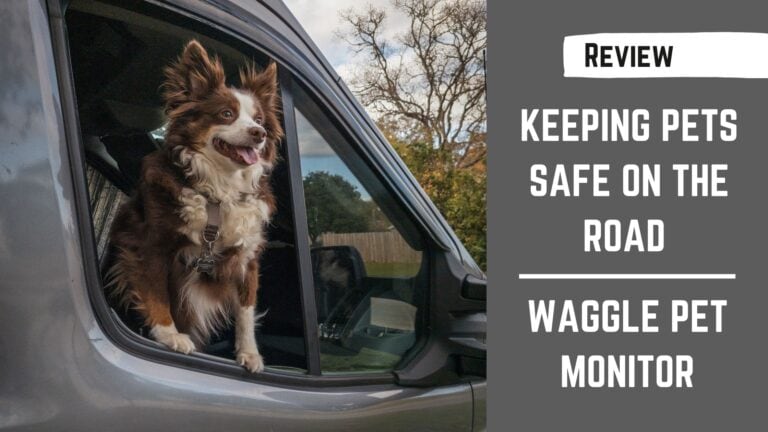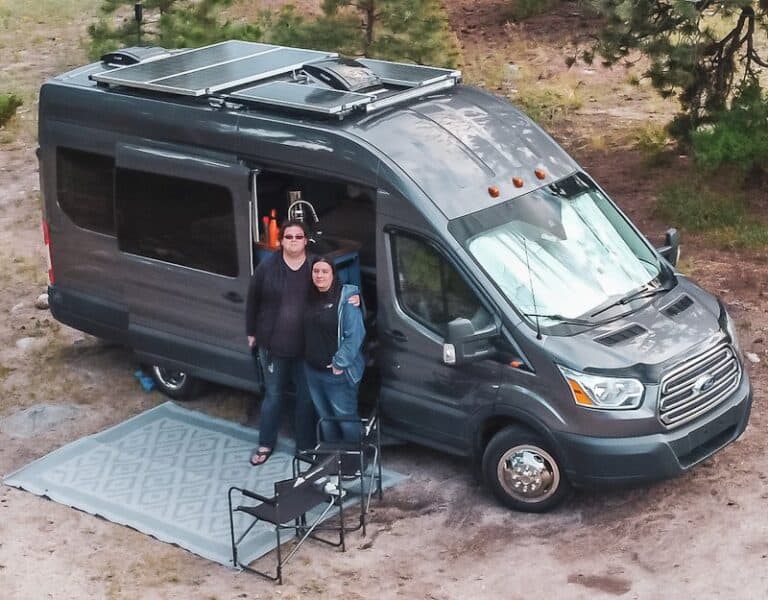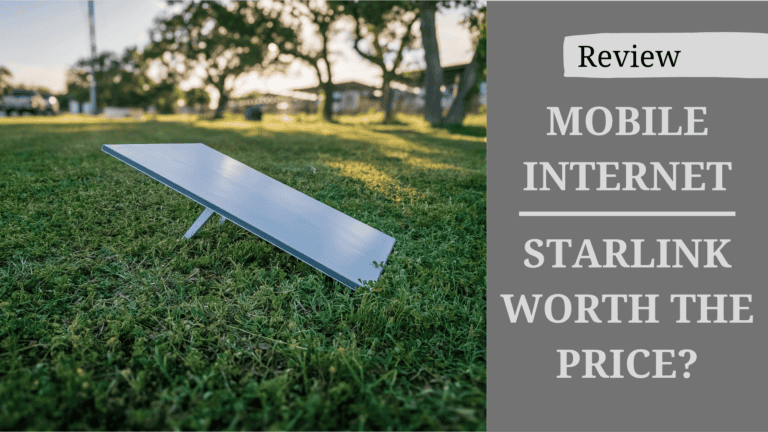We’ve all seen those Instagram photos of the van parked in a snow-covered field with the rear doors wide open, people drinking a hot beverage while sitting in bed all warm. Just how realistic is that? Can you actually keep your campervan warm enough to enjoy the snow? Or will you be cold? The secret is having good campervan heating.
While having the rear doors of your van wide open during a snowfall is not a recommended way of staying warm. Having a good campervan heater will keep you warm and cozy, so long as the doors remain closed most of the time.
Do I Need A Campervan Heater?
Do you need a camper van heater? I mean, Isn’t insulation enough to keep you warm?
Unfortunately, just insulating your campervan is not enough to keep you cozy during a cold winter night. Insulation helps mitigate heat transfer, whether that is keeping the heat in during the winter or preventing heat from warming you up too much in the summer.
The role of campervan heating is to introduce heat into your van, which the insulation can then trap inside, keeping you warm and cozy. If you enjoy winter and plan to spend time in cold climates, you will want good insulation and a good heater for your campervan.
Even if you plan on avoiding cold places during your travels, having a campervan heater is still a great idea, as you can never really avoid random cold fronts.
What Kind of Heaters For Campervans Are There?
You will need a heater for your campervan, especially if you plan to travel to cold areas. But what kind of heater is best for you and your campervan? Propane furnaces, diesel heaters, wood stoves, and increasingly electric heaters are the most common campervan heaters.
Each type of van life heater has pros and cons that, depending on your van’s build and the climates you plan on visiting, may affect what is best for you. We’ll cover them all in one post to help you find the perfect campervan heater.
Diesel Campervan Heating
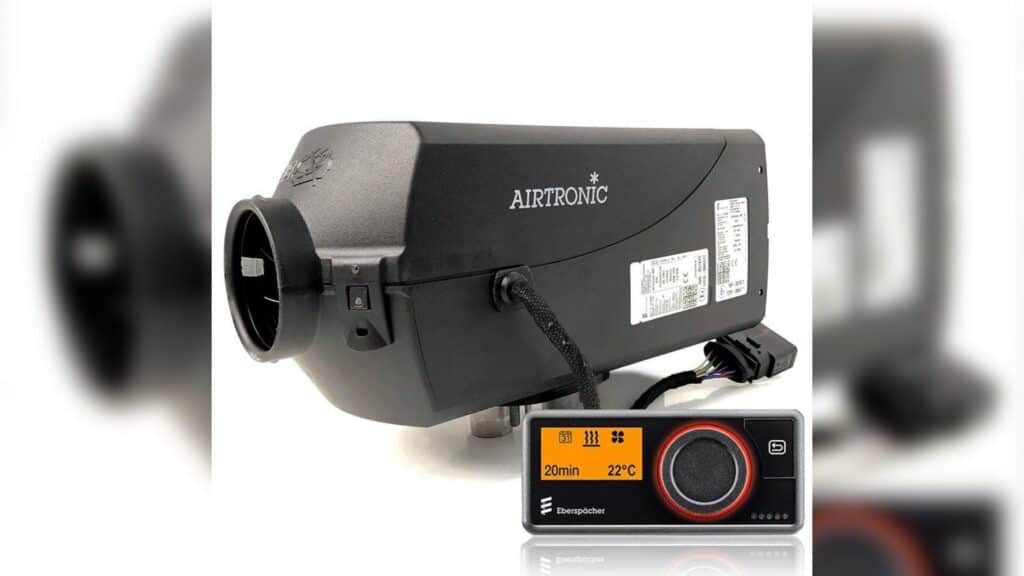
Diesel heaters draw diesel from either your camper van’s fuel tank or a small auxiliary diesel tank that you can mount inside or under your van. They work by pulling fresh air into the heater from outside to burn diesel that heats a heat exchanger.
The exhaust is vented from the sealed combustion chamber back outside, so you have no issues with exhaust inside your van. At the same time, the heat exchanger blows hot air into your van with the help of a 12v fan.
Diesel heaters provide dry heat that does not introduce moisture into your van due to their vented design, helping to control condensation.
Diesel heaters are incredibly fuel-efficient, burning on average one gallon of diesel for every 24 hours of run time and drawing only around 10-30w of power while running. The Espar D2 diesel heater and the Webasto Air Top diesel heater are the most popular diesel heaters. There are also dozens of cheaper brands available that people can use without issues.
Pros
- Fuel efficient.
- It is quiet when running.
- Dry heat helps to prevent condensation.
- It can be used with a thermostat.
Cons
- Expensive to buy and install.
- It needs regular maintenance to remain reliable.
Gassoline Campervan Heating
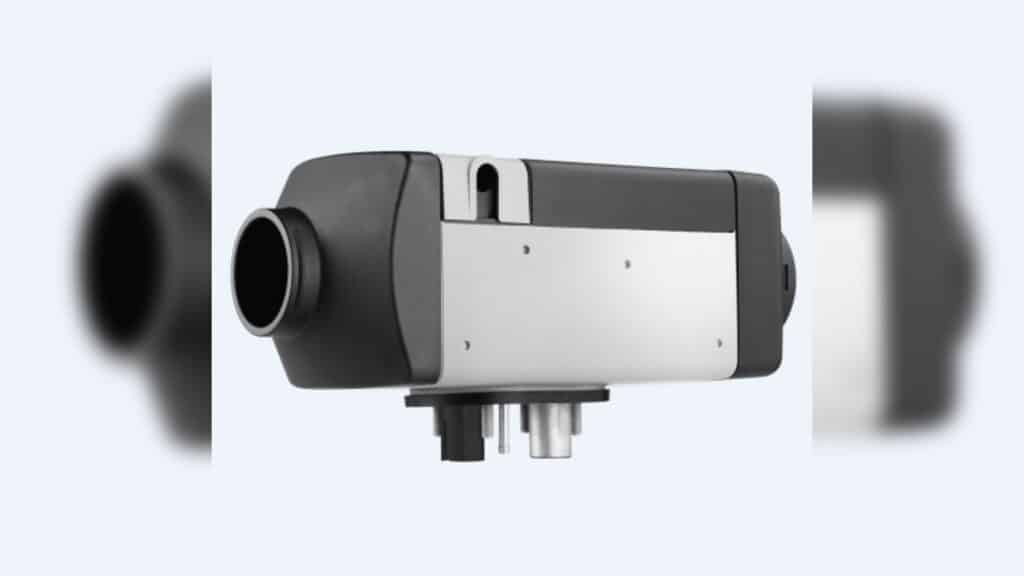
Gasoline heaters work the same as diesel heaters; they burn gasoline instead. They draw air into a sealed combustion chamber to ignite the gas, heating a heat exchanger and then expelling the exhaust back outside. Like diesel heaters, gasoline heaters also provide dry heat and can have a thermostat to control the temperature.
So, what’s the advantage of a gasoline heater over a diesel heater?
If you install a diesel heater and have a gas-powered van, you must install a diesel fuel tank somewhere inside or under your van to run your heater. On the other hand, a gasoline heater can be hooked straight into your van’s main fuel tank, so there is no need for an extra tank. Don’t worry; gas and diesel heaters have automatic shutoffs, so they will not use all of your van’s fuel, leaving you stranded.
Pros
- Able to draw gas-powered vans from the fuel tank.
- It is quiet when in operation.
- Dry heat helps to prevent condensation.
- It can be used with a thermostat.
Cons
- Requires regular maintenance to be reliable
- Expensive to buy and install.
Portable Propane Heater
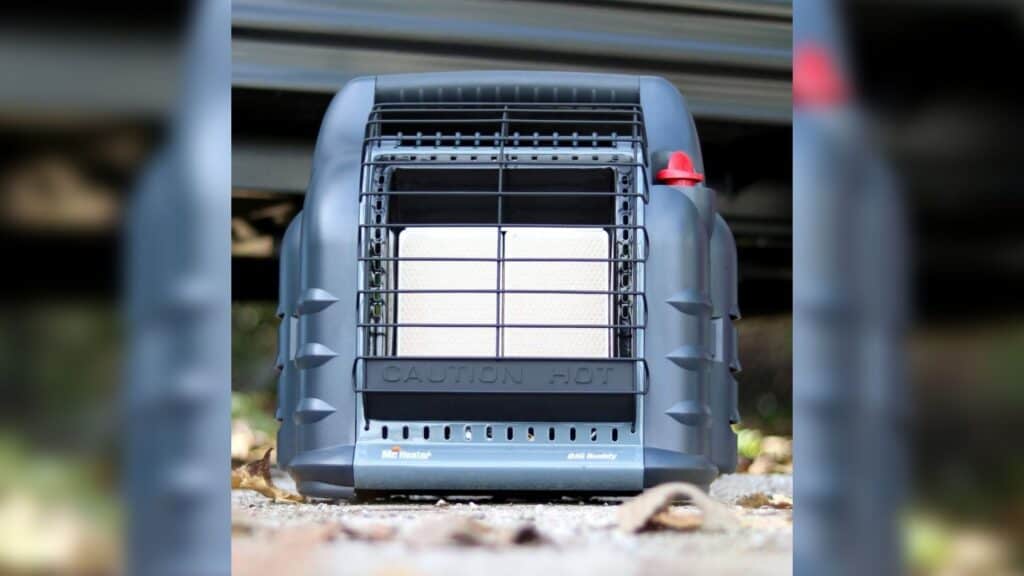
When people talk about propane heaters in a campervan, they almost always refer to portable propane heaters. However, portable propane heaters are not the only type available, although they are the easiest to set up.
The Mr. Buddy heater has become the go-to portable propane heater for most people traveling in a campervan. These heaters are so popular among campervan owners because you do not have to install anything. There are no fuel lines to run through your van, and they put out a large amount of heat while being relatively low cost.
Our campervan has a Buddy heater that we can pull out on cold days. It keeps our larger extended transit van toasty without any issues. The heater can run for 11 hours on 2 lbs of propane.
There are downsides to having a portable campervan propane heater, though. For one, portable heaters can introduce moisture into your van because they do not draw air in from outside and do not have an exhaust vent. You must keep a roof vent or window open a bit to allow some fresh air into your van to prevent carbon monoxide buildup.
Not to worry, though. Mr. Buddy’s heaters have built-in oxygen sensors that will cut off the heater if it detects any carbon monoxide issues. They also come with a knock-over sensor that will automatically shut off the heater if it tips over.
Our biggest tip for preventing condensation buildup is to keep a window open a bit and a roof vent running on low. This way, a constant supply of fresh air is drawn through the van to prevent moisture buildup. We have never had any issues with condensation while running a portable propane heater with this setup.
Pros
- Low cost.
- Well built.
- Automatic safety cutoffs
- There is no need for a permanent installation with fuel lines and auxiliary fuel tanks.
- It can be used both inside and outside.
Cons
- It can cause condensation when there is not adequate ventilation.
- It uses a lot of propane when on high.
Wood Burning Campervan Heating

Who doesn’t love a wood-burning stove? They look fantastic, provide dry heat, allow you to find deadfall wood to burn for free, and even roast marshmallows from the comfort of your own home.
Unfortunately, wood stoves are not the best kind of heater for your campervan. Insurance companies do not like it if you have a wood stove inside a vehicle and may even deny coverage if they find out you have one. Plus, you will need a pretty large space inside your van where the woodstove will be installed, as it needs heat barriers between it and any walls.
Not only do you need a large space for the wood stove, but you will also need to have a chimney that goes up through your roof, which can be difficult if you plan to have a solar array or roof deck on top of your van.
That does not mean you cannot have a wood stove in your campervan. A few brands make wall-mounted wood stoves, like the Dickinson Solid Fuel Heater. A wall-mounted wood stove will not take up as much space as a traditional free-standing stove.
Wood stoves are also popular in school bus conventions or skoolies, as they generally have much more space than a van does.
Pros
- Due to being a vented heat source, wood stoves provide dry heat.
- Wood stoves look great and provide a warm and cozy environment.
Cons
- Some campgrounds will not allow rigs with a wood stove.
- Finding auto insurance for your van or bus can be tough with a wood stove.
- Requires a chimney.
- Firewood takes up a lot of space
- It needs to be fed more wood throughout the night to stay lit.
Electric Heating For Campervans
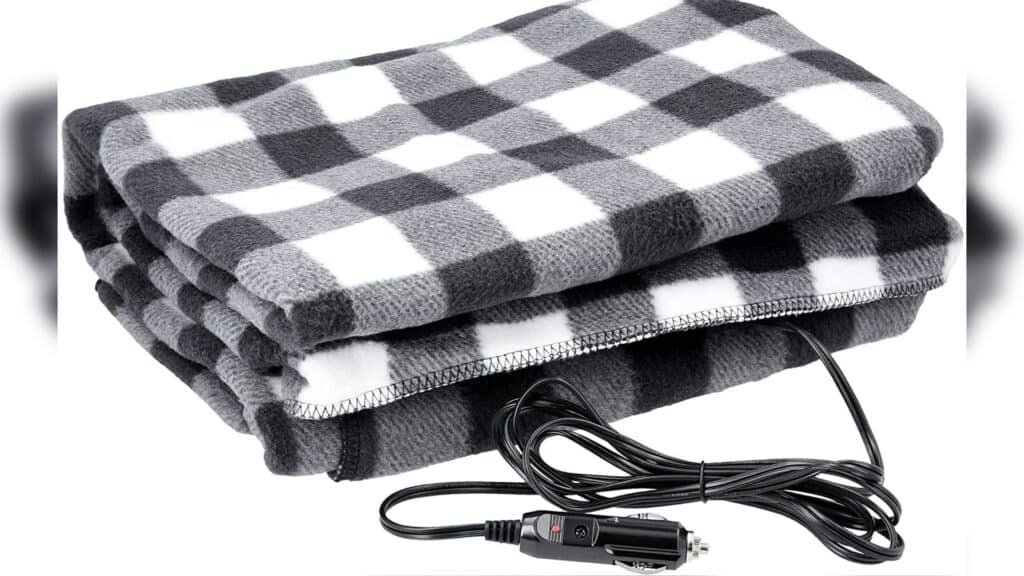
Electric space heaters are by far the easiest to use. There is no fuel to burn, nothing to install, and you can just set your desired temperature and walk away. The only issue is that they draw a lot of power. If you plan to have your campervan in an off-grid electric space, heaters will not be possible due to their high power consumption.
If you plan to spend most of your time at campgrounds where you can plug your van in, then an electric heater might be the way to go. For purely off-grid vans, you’ll need to go another route. Even if you had a massive battery bank, eclectic space heaters draw too much power to be feasible off-grid.
The good news is that 12v heaters are becoming more common. The best part about them is that they do not draw much power and can be used off-grid. 12v heating blankets, for example, are an excellent option for an off-grid campervan. While a heated blanket may not keep your entire van warm at night, it will keep you warm in bed.
The best part is that they draw about the same amount of power as a powered roof vent fan, meaning you can use the 12v blanket through the night without draining your batteries. Then, when you wake up, you can use your main camper heater to warm up the entire van for the day.
Pros
- The 12v heated blanket draw had less power than a standard electric heater.
- It takes up very little space when not in use.
Cons
- 12v heated blankets only keep what is under the blanket warm and do not heat the entire space.
Are Campervan Heaters Safe?
All campervan heaters do carry an inherent risk to them. In general, though, campervan heaters are completely safe so long as they are installed and used correctly. Each type of campervan heater has its own set of risks when misused or left unmaintained.
Diesel and gasoline heaters must be regularly cleaned and maintained as they develop carbon deposit buildups inside their exhaust hoses that can lead to a fire. You should also periodically check the fuel lines that supply the heater to ensure they are in good condition and have not developed a leak somewhere.
Propane heaters that are not vented can cause high carbon monoxide levels if they do not have proper ventilation. Portable propane heaters and electric space heaters can also be knocked over. While electric and propane heaters have automatic shutoffs, they can still be hot enough that they can start a fire even while off.
Woodstoves can also have chimney buildups that can cause fires, along with the general risks of having a fire, even if contained, inside of your vehicle.
Just because campervan heaters have an inherent risk does not mean they are unsafe, though. It just means that you must take precautions and steps to ensure you will never have any issues.
Some of our tips for staying safe are:
- Always have a fire alarm installed in your campervan
- Have a carbon monoxide alarm
- Keep a fire extinguisher inside your van at all times
- Make sure you know how to operate your heater
- Create and follow a maintenance routine
- Avoid fire hazards such as leaving flammable items near your heater
- Have proper ventilation when using a propane heater
Staying Warm In A Campervan
Good campervan heating may not be enough to keep you warm in winter. Campervan heating is just one part of climate control inside your van. The other core pillars to staying comfortable in your campervan year-round are:
- Insulation: Properly installed insulation throughout your walls, ceiling, and floor helps keep heat in during the winter and heat out during the summer. Your campervan heater cannot maintain a comfortable temperature inside without good insulation.
- Ventilation: If you do not have an air conditioner, you will need good ventilation to stay cool during summer. The best way to achieve this is by installing rooftop vent fans, such as a MaxxAir fan. During the winter, good ventilation will also help prevent condensation if you use electric or propane heating in your campervan.
- Window Covers: Glass can conduct heat incredibly well, which you do not want when it is cold outside. Good window covers that prevent the cold from coming through your windows are necessary. Window covers are even more critical during the summer to help prevent the sun from heating up your van like a solar oven.
- Rugs! Basically, everyone who converts a van uses some vinyl flooring. Even almost every production RV has vinyl flooring. Why? Because it is easy to keep clean. When you are constantly camping, dirt and sand will get tracked inside your campervan daily, so keeping the floors clean is necessary. However, that means a frigid floor during the winter months. We throw down a rug that fits our floor to fix that. The carpet acts as insulation and prevents cold from entering the floor.
TL;DR
There are many great options for campervan heating, each with its own benefits and downsides, so it really comes down to what will work best for you and how you want to travel. The main things to remember are:
- Diesel and gasoline heaters provide dry heat but must be cleaned and maintained regularly.
- Portable Propane heaters work great but can introduce moisture into the air and need good ventilation to prevent carbon monoxide build-up.
- Wood stoves may look pretty but have several hurdles you will need to overcome, such as auto insurance and the space required to install one.
- Household electrical space heaters draw way too much power to be used off-grid
- 12v electric heated blankets are a great option that does not draw much power but only heat a small space.
- Always have both a fire alarm and carbon monoxide alarm correctly installed inside your van.
- Keep a fire extinguisher in your van at all times.
- Having a heater is only part of staying warm. You also need good insulation and insulated window covers. Rugs will help keep your floor warm as well.
